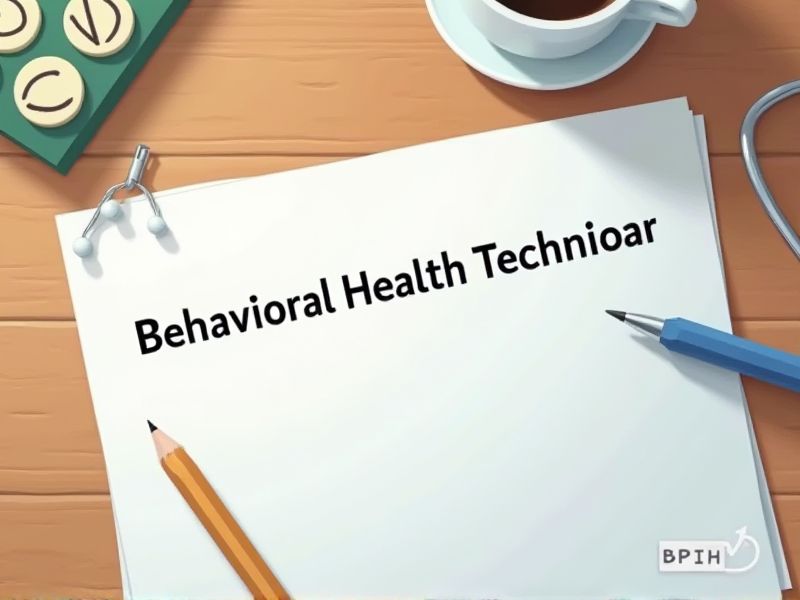
Behavioral Health Technicians require certain certifications to ensure they have the necessary skills and knowledge to assist clients effectively. Certifications validate that technicians understand complex mental health issues and are equipped to handle challenging situations. They also provide a standardized level of competence which is crucial in maintaining quality care in diverse settings. Key certifications for a Behavioral Health Technician include several that focus on specific areas of expertise and adherence to professional standards.
Certified Behavioral Health Technician (CBHT)
Certified Behavioral Health Technicians (CBHT) ensure standardized, high-quality care by adhering to proven protocols and guidelines. This certification often enhances treatment outcomes by providing technicians with specialized skills in patient interaction and crisis management. Employers tend to seek certified individuals due to their demonstrated commitment to professional development and competence. Certification can also lead to greater job opportunities and career advancement for technicians in the behavioral health field.
Mental Health Technician Certification
Obtaining a Mental Health Technician Certification demonstrates a recognized standard of expertise and knowledge in the field. It can lead to improved job prospects, as employers often prefer certified professionals. Certification ensures that technicians are equipped with up-to-date skills and techniques to handle various behavioral health situations effectively. It also fosters trust among patients and colleagues, enhancing the safety and quality of care provided.
Crisis Prevention and Intervention Certification
Behavioral health technicians often encounter situations requiring de-escalation skills, and Crisis Prevention and Intervention Certification provides these professionals with essential strategies to handle such scenarios effectively. This certification equips technicians with techniques to manage and reduce the potential harm during crises, thus ensuring safety for both patients and staff. Completing this training typically leads to enhanced confidence and professionalism when addressing unpredictable behaviors. Many healthcare facilities mandate this certification as part of their compliance with safety regulations and standards of care.
Mental Health First Aid Certification
Behavioral Health Technicians often encounter individuals in crisis, so Mental Health First Aid Certification equips them with essential skills to provide initial support. Without this training, technicians may struggle to effectively recognize signs of mental health issues, potentially delaying critical interventions. Proper certification helps in bridging the gap between identifying issues and accessing professional treatment. Knowledge from this course enhances the technician's ability to contribute to a supportive and informed care environment.
Suicide Prevention Certification
Suicide prevention certification enhances the ability of behavioral health technicians to identify warning signs and take timely action. This specialized training equips them with the necessary skills to effectively intervene in high-risk situations, reducing the potential for harm. Certification fosters a deeper understanding of the complexities surrounding suicidal behavior, leading to more empathetic and informed support for individuals in crisis. Having certified technicians ensures that mental health facilities adhere to safety protocols and improve overall patient care.
CPR/AED Certification
Behavioral Health Technicians may encounter emergencies where CPR/AED certification can directly impact the survival of individuals experiencing cardiac arrest. This certification equips them with the skills to stabilize life-threatening situations, which is crucial in high-stress behavioral health environments. Knowledge of CPR/AED fosters a safer setting for both patients and staff by ensuring immediate and effective response to cardiac emergencies. Having certified staff can also align with policies of healthcare facilities that prioritize comprehensive safety protocols.
Basic Life Support (BLS) Certification
Basic Life Support (BLS) Certification equips Behavioral Health Technicians with essential skills to respond to medical emergencies like cardiac arrest, which frequently occur in populations with high stress or substance abuse issues. Understanding and performing basic CPR and first aid techniques significantly increase the survival rate of individuals in critical situations. Having BLS certification ensures that technicians meet industry standards, enhancing their employability and trustworthiness in healthcare facilities. This certification aids in creating a safer and more responsive environment for both patients and staff.
Crisis Intervention Team (CIT) Training
The increase in mental health-related emergencies often results in encounters with law enforcement, and this context sometimes escalates situations without appropriate handling. CIT training equips Behavioral Health Technicians with de-escalation techniques, reducing the risk of harm to both individuals in crisis and first responders. Data shows that CIT-trained personnel can identify signs of mental illness, leading to more effective and compassionate outcomes. The integration of CIT training promotes collaboration between mental health professionals and law enforcement, potentially improving overall public safety and trust.
De-escalation Techniques Certification
Behavioral health technicians often encounter situations involving individuals in crisis, so de-escalation techniques certification enhances their ability to safely manage such scenarios. This certification provides the necessary skills to diffuse tense interactions, reducing the risk of harm to both the technician and the individual involved. Training in these techniques contributes to a more supportive and calming environment, which can lead to better therapeutic outcomes. Regulatory standards increasingly mandate such certifications to ensure that best practices are consistently applied in behavioral health settings.
Trauma-Informed Care Certification
Trauma-Informed Care Certification equips behavioral health technicians with the skills to recognize and address the impacts of trauma on clients. Without this training, there is a risk of retraumatization, which can impede recovery and trust-building. Understanding the principles of trauma-informed care enhances communication techniques, fostering a safer therapeutic environment. Certification ensures technicians are compliant with industry standards and best practices, which can improve treatment outcomes.
Summary
By obtaining certifications, you as a Behavioral Health Technician can enhance your skill set, which may lead to improved job performance. Certifications can increase your employability, offering you greater opportunities for advancement within the field. You might experience increased job satisfaction through a deeper knowledge and ability to make a difference in patients' lives. Employers may recognize your added value, potentially resulting in higher wages or better job assignments for you.
